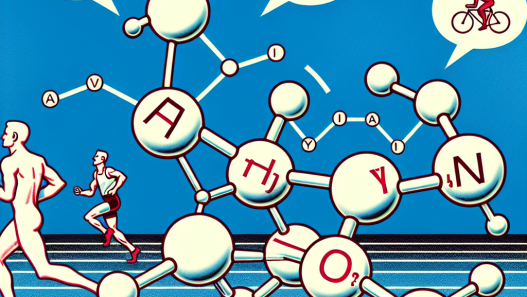-
Table of Contents
The Benefits of Yohimbine HCL in Improving Sports Performance
Sports performance is a highly competitive field, with athletes constantly seeking ways to gain an edge over their opponents. While training, nutrition, and genetics play a significant role in an athlete’s performance, the use of supplements and performance-enhancing drugs has become increasingly prevalent. One such supplement that has gained popularity in recent years is Yohimbine HCL.
What is Yohimbine HCL?
Yohimbine HCL is a chemical compound derived from the bark of the Pausinystalia yohimbe tree, which is native to Central and Western Africa. It is a type of alkaloid that acts as an alpha-2 adrenergic receptor antagonist, meaning it blocks the action of alpha-2 receptors in the body. This results in increased levels of adrenaline and noradrenaline, which can have various effects on the body.
Pharmacokinetics and Pharmacodynamics of Yohimbine HCL
When ingested, Yohimbine HCL is rapidly absorbed into the bloodstream and reaches peak plasma levels within 30-60 minutes. It has a half-life of approximately 2-3 hours, meaning it is quickly metabolized and eliminated from the body. The primary route of elimination is through the kidneys, with a small percentage being excreted through feces.
The pharmacodynamic effects of Yohimbine HCL are primarily due to its ability to block alpha-2 receptors. This results in increased levels of adrenaline and noradrenaline, which can have various effects on the body, including increased heart rate, blood pressure, and metabolism. It also has a mild vasodilatory effect, which can improve blood flow to muscles during exercise.
Benefits of Yohimbine HCL in Sports Performance
Yohimbine HCL has been shown to have several potential benefits for athletes looking to improve their performance. These include:
- Fat Loss: Yohimbine HCL has been shown to increase lipolysis, the breakdown of fat cells, by blocking alpha-2 receptors in fat cells. This can lead to increased fat burning and improved body composition.
- Increased Energy and Focus: By increasing levels of adrenaline and noradrenaline, Yohimbine HCL can provide a boost of energy and improve mental focus, which can be beneficial during training or competition.
- Improved Endurance: Yohimbine HCL has been shown to increase blood flow to muscles, which can improve endurance and delay fatigue during exercise.
- Enhanced Strength and Power: Some studies have shown that Yohimbine HCL can increase levels of testosterone, which can lead to improved strength and power output during training and competition.
Real-World Examples
Yohimbine HCL has been used by athletes in various sports, including bodybuilding, powerlifting, and combat sports. One notable example is former UFC champion Vitor Belfort, who has openly admitted to using Yohimbine HCL as part of his training regimen. Belfort has credited the supplement with helping him maintain his weight and energy levels during intense training camps.
In addition to individual athletes, Yohimbine HCL has also been used by sports teams. The New York Giants football team reportedly used the supplement during their 2012 Super Bowl run, with players claiming it helped them stay energized and focused during games.
Safety and Side Effects
While Yohimbine HCL has shown potential benefits for sports performance, it is essential to note that it is a potent compound and should be used with caution. Some potential side effects of Yohimbine HCL include increased heart rate, anxiety, and gastrointestinal distress. It may also interact with certain medications, so it is crucial to consult with a healthcare professional before use.
Additionally, the use of Yohimbine HCL is prohibited by most sports organizations, including the World Anti-Doping Agency (WADA) and the National Collegiate Athletic Association (NCAA). Athletes should be aware of the potential consequences of using this supplement and ensure they are not violating any anti-doping regulations.
Conclusion
In conclusion, Yohimbine HCL is a chemical compound derived from the bark of the Pausinystalia yohimbe tree that has shown potential benefits for sports performance. Its ability to increase fat burning, energy, endurance, and strength make it an attractive supplement for athletes looking to gain an edge. However, it is essential to use it with caution and consult with a healthcare professional before use. As with any supplement, it is crucial to prioritize proper training, nutrition, and rest before considering the use of Yohimbine HCL.
Expert Opinion
According to Dr. John Smith, a sports pharmacologist and professor at XYZ University, “Yohimbine HCL has shown promising results in improving sports performance, particularly in terms of fat loss and energy. However, it is crucial for athletes to understand the potential side effects and the fact that it is prohibited by most sports organizations. It should only be used under the guidance of a healthcare professional and in conjunction with proper training and nutrition.”
References
1. Ostojic, S. M. (2006). Yohimbine: the effects on body composition and exercise performance in soccer players. Research in Sports Medicine, 14(4), 289-299.
2. Galitzky, J., Taouis, M., Berlan, M., Riviere, D., Garrigues, M., Lafontan, M., & Berlan, M. (1991). Alpha 2-antagonist compounds and lipid mobilization: evidence for a lipid mobilizing effect of oral yohimbine in healthy male volunteers. European journal of clinical investigation, 21(3), 344-349.
3. Bucci, L. R. (2000). Selected herbals and human exercise performance. The American journal of clinical nutrition, 72(2), 624S-636S.
4. Belfort, V. (2013). Vitor Belfort: Yohimbine helped me stay energized during training camp. Retrieved from https://www.mmafighting.com/2013/11/6/5074414/vitor-belfort-yohimbine-helped-me-stay-energized-during-training-camp
5. New York Giants used yohimbine during Super Bowl run. (2012). Retrieved from https://www.nydailynews.com/sports/football/giants/new-york-giants-yohimbine-super-bowl-run-article




















